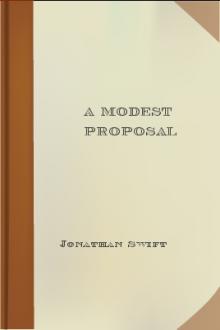The Devil's Dictionary by Ambrose Bierce (good novels to read in english TXT) 📗

- Author: Ambrose Bierce
Book online «The Devil's Dictionary by Ambrose Bierce (good novels to read in english TXT) 📗». Author Ambrose Bierce
"Name it."
"Man, I understand, is about to be created. He will need laws."
"What, wretch! you his appointed adversary, charged from the dawn of eternity with hatred of his soul—you ask for the right to make his laws?"
"Pardon; what I have to ask is that he be permitted to make them himself."
It was so ordered.
SATIETY, n. The feeling that one has for the plate after he has eaten its contents, madam.
SATIRE, n. An obsolete kind of literary composition in which the vices and follies of the author's enemies were expounded with imperfect tenderness. In this country satire never had more than a sickly and uncertain existence, for the soul of it is wit, wherein we are dolefully deficient, the humor that we mistake for it, like all humor, being tolerant and sympathetic. Moreover, although Americans are "endowed by their Creator" with abundant vice and folly, it is not generally known that these are reprehensible qualities, wherefore the satirist is popularly regarded as a sour-spirited knave, and his ever victim's outcry for codefendants evokes a national assent.
Hail Satire! be thy praises ever sung In the dead language of a mummy's tongue, For thou thyself art dead, and damned as well— Thy spirit (usefully employed) in Hell. Had it been such as consecrates the Bible Thou hadst not perished by the law of libel.Barney Stims
SATYR, n. One of the few characters of the Grecian mythology accorded recognition in the Hebrew. (Leviticus, xvii, 7.) The satyr was at first a member of the dissolute community acknowledging a loose allegiance with Dionysius, but underwent many transformations and improvements. Not infrequently he is confounded with the faun, a later and decenter creation of the Romans, who was less like a man and more like a goat.
SAUCE, n. The one infallible sign of civilization and enlightenment. A people with no sauces has one thousand vices; a people with one sauce has only nine hundred and ninety-nine. For every sauce invented and accepted a vice is renounced and forgiven.
SAW, n. A trite popular saying, or proverb. (Figurative and colloquial.) So called because it makes its way into a wooden head. Following are examples of old saws fitted with new teeth.
A penny saved is a penny to squander. A man is known by the company that he organizes. A bad workman quarrels with the man who calls him that. A bird in the hand is worth what it will bring. Better late than before anybody has invited you. Example is better than following it. Half a loaf is better than a whole one if there is much else. Think twice before you speak to a friend in need. What is worth doing is worth the trouble of asking somebody to do it. Least said is soonest disavowed. He laughs best who laughs least. Speak of the Devil and he will hear about it. Of two evils choose to be the least. Strike while your employer has a big contract. Where there's a will there's a won't.SCARABAEUS, n. The sacred beetle of the ancient Egyptians, allied to our familiar "tumble-bug." It was supposed to symbolize immortality, the fact that God knew why giving it its peculiar sanctity. Its habit of incubating its eggs in a ball of ordure may also have commended it to the favor of the priesthood, and may some day assure it an equal reverence among ourselves. True, the American beetle is an inferior beetle, but the American priest is an inferior priest.
SCARABEE, n. The same as scarabaeus.
He fell by his own hand Beneath the great oak tree. He'd traveled in a foreign land. He tried to make her understand The dance that's called the Saraband, But he called it Scarabee. He had called it so through an afternoon, And she, the light of his harem if so might be, Had smiled and said naught. O the body was fair to see, All frosted there in the shine o' the moon— Dead for a Scarabee And a recollection that came too late. O Fate! They buried him where he lay, He sleeps awaiting the Day, In state, And two Possible Puns, moon-eyed and wan, Gloom over the grave and then move on. Dead for a Scarabee! Fernando TappleSCARIFICATION, n. A form of penance practised by the mediaeval pious. The rite was performed, sometimes with a knife, sometimes with a hot iron, but always, says Arsenius Asceticus, acceptably if the penitent spared himself no pain nor harmless disfigurement. Scarification, with other crude penances, has now been superseded by benefaction. The founding of a library or endowment of a university is said to yield to the penitent a sharper and more lasting pain than is conferred by the knife or iron, and is therefore a surer means of grace. There are, however, two grave objections to it as a penitential method: the good that it does and the taint of justice.
SCEPTER, n. A king's staff of office, the sign and symbol of his authority. It was originally a mace with which the sovereign admonished his jester and vetoed ministerial measures by breaking the bones of their proponents.
SCIMITAR, n. A curved sword of exceeding keenness, in the conduct of which certain Orientals attain a surprising proficiency, as the incident here related will serve to show. The account is translated from the Japanese of Shusi Itama, a famous writer of the thirteenth century.
When the great Gichi-Kuktai was Mikado he condemned to decapitation Jijiji Ri, a high officer of the Court. Soon after the hour appointed for performance of the rite what was his Majesty's surprise to see calmly approaching the throne the man who should have been at that time ten minutes dead! "Seventeen hundred impossible dragons!" shouted the enraged monarch. "Did I not sentence you to stand in the market-place and have your head struck off by the public executioner at three o'clock? And is it not now 3:10?" "Son of a thousand illustrious deities," answered the condemned minister, "all that you say is so true that the truth is a lie in comparison. But your heavenly Majesty's sunny and vitalizing wishes have been pestilently disregarded. With joy I ran and placed my unworthy body in the market-place. The executioner appeared with his bare scimitar, ostentatiously whirled it in air, and then, tapping me lightly upon the neck, strode away, pelted by the populace, with whom I was ever a favorite. I am come to pray for justice upon his own dishonorable and treasonous head." "To what regiment of executioners does the black-boweled caitiff belong?" asked the Mikado. "To the gallant Ninety-eight Hundred and Thirty-seventh—I know the man. His name is Sakko-Samshi."




Comments (0)